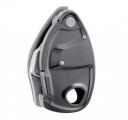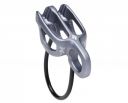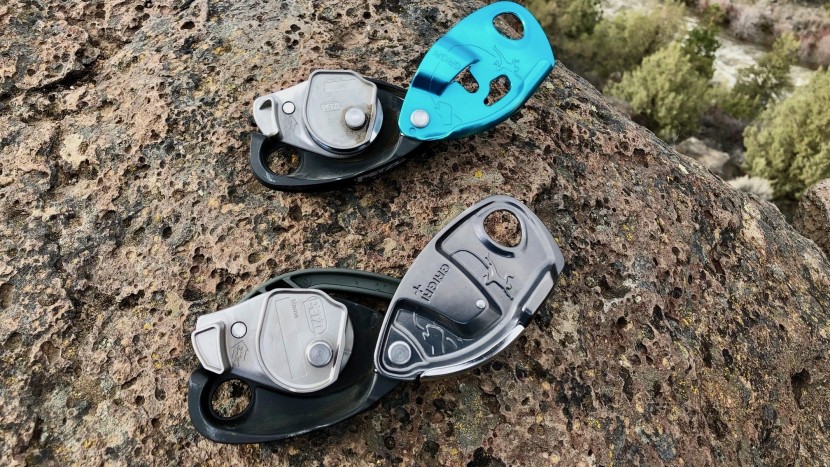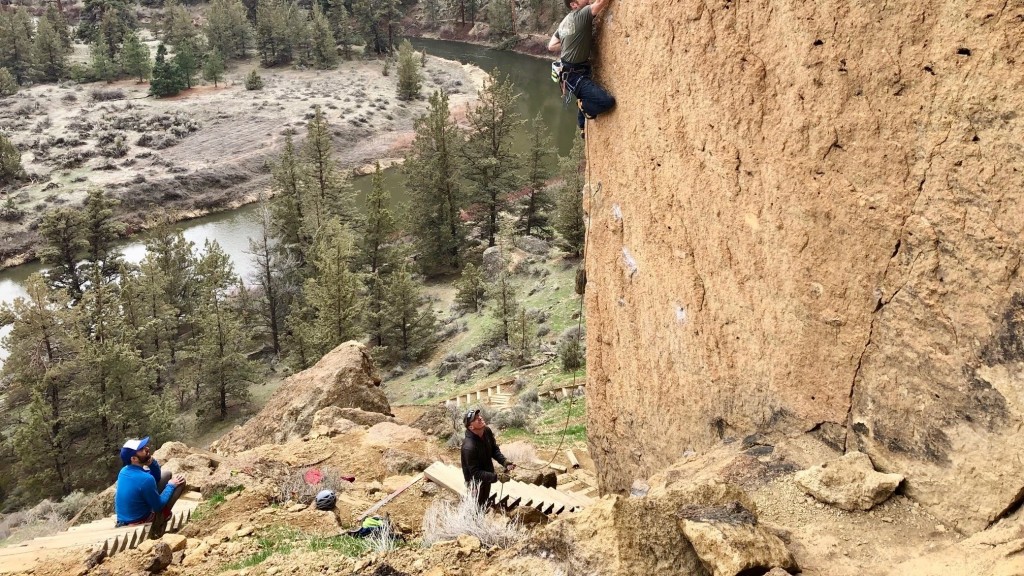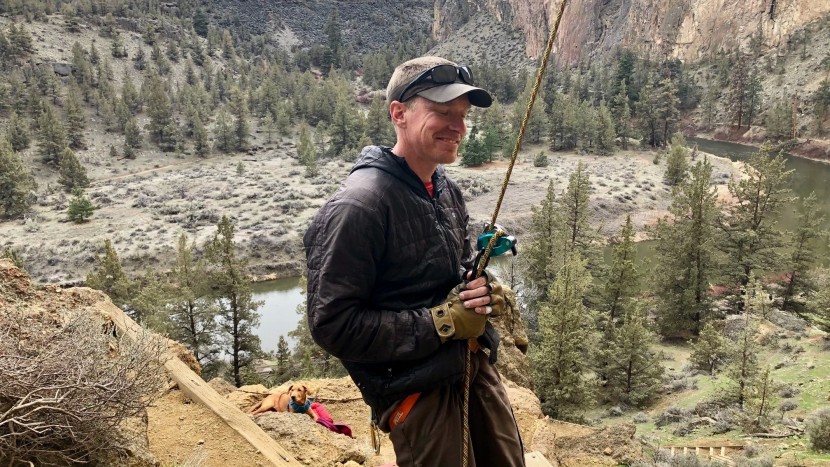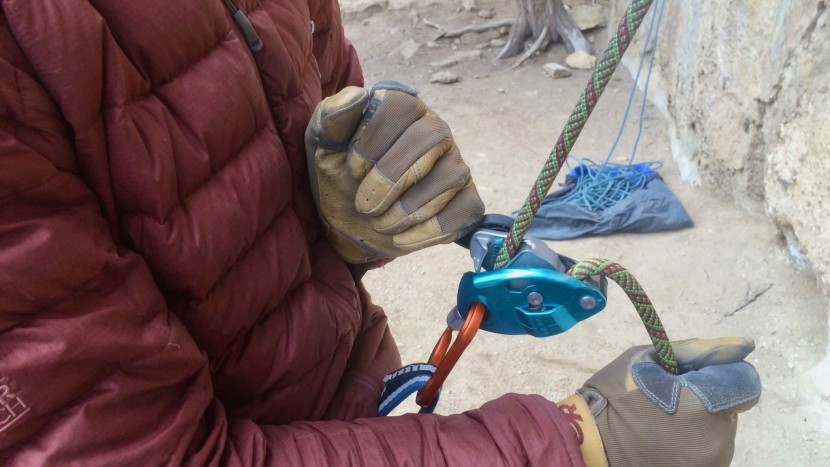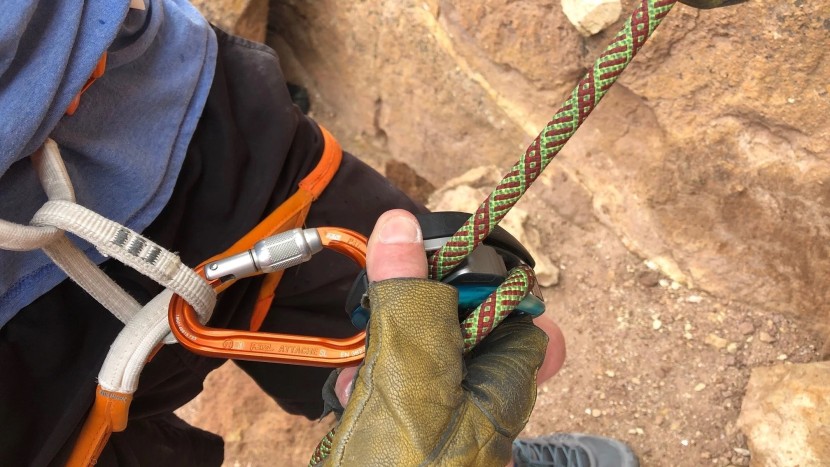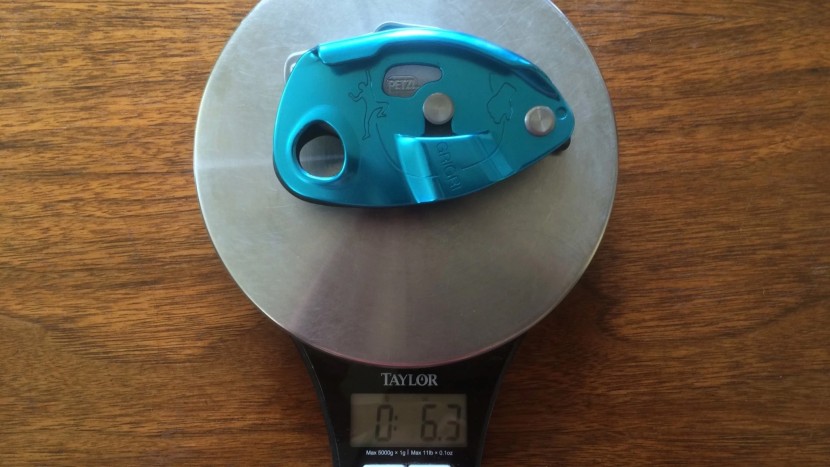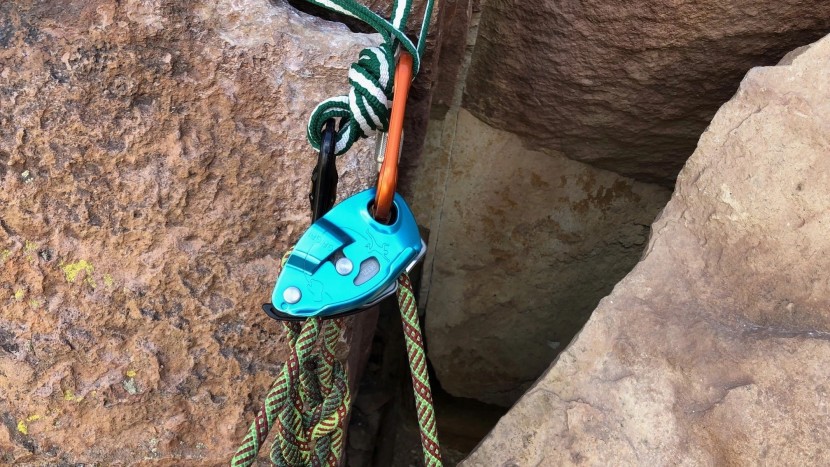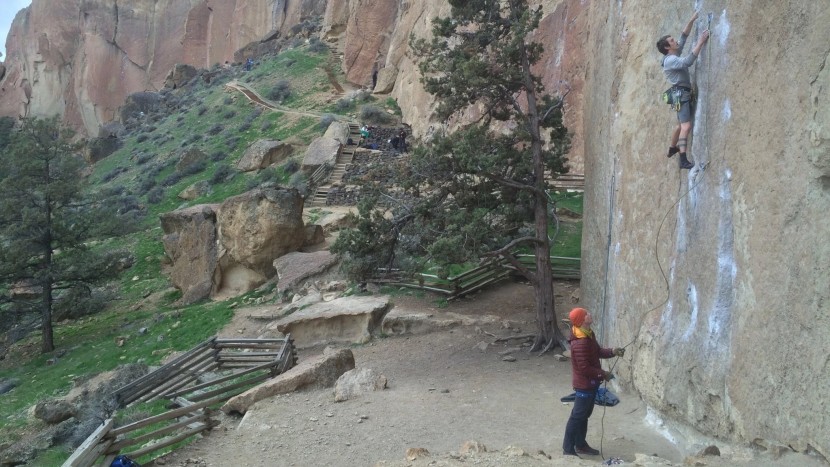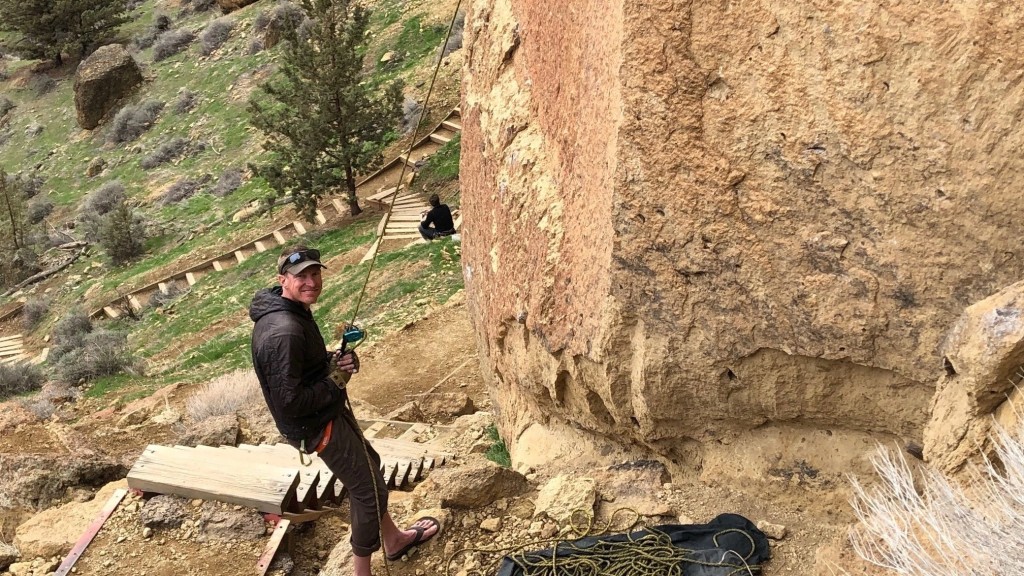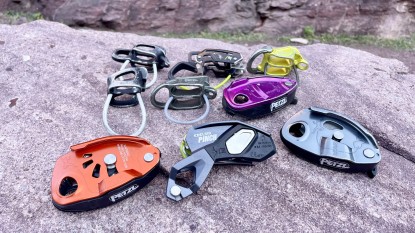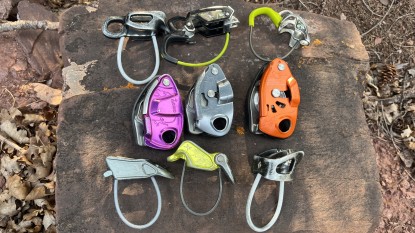Our Verdict
Compare to Similar Products
 This Product
Petzl GriGri | |||||
|---|---|---|---|---|---|
| Awards | Best Overall for Experienced Climbers | Best for New Climbers | Most Versatile | Best Bang for the Buck | |
| Price | $95.00 at Amazon Compare at 3 sellers | $113.00 at Amazon Compare at 2 sellers | $59.95 at REI Compare at 3 sellers | $37.88 at Amazon Compare at 3 sellers | $25 List $24.95 at Amazon |
Overall Score  |
|||||
| Star Rating | |||||
| Bottom Line | By far the most popular belay device in the world is also one of the very best | A versatile assisted-braking device with well-designed safety features | A unique combination of many different belay modes in one device | Simple, durable, and optimal value for multi pitch climbs | Low price pairs well with the basic tube style design and reliability |
| Rating Categories | Petzl GriGri | Petzl GriGri+ | Edelrid Giga Jul | Black Diamond ATC G... | Black Diamond ATC XP |
| Catch and Bite (30%) | |||||
| Lowering and Rappelling (30%) | |||||
| Feeding Slack (20%) | |||||
| Weight and Bulk (10%) | |||||
| Auto Block (10%) | |||||
| Specifications | Petzl GriGri | Petzl GriGri+ | Edelrid Giga Jul | Black Diamond ATC G... | Black Diamond ATC XP |
| Style | Active assisted braking | Active assisted braking | Passive assisted braking | Auto-block tube | Tube style |
| Recommended Rope Diameter (Single) | 8.5 mm - 11 mm (optimized for 8.9 mm - 10.5 mm) | 8.5 mm - 11 mm (optimized for 8.9 mm - 10.5 mm) | Assisted: N/A Manual: 8.6 mm - 9.1 mm |
8.9 mm - 11 mm | 9 mm - 11 mm |
| Recommended Rope Diameter (Half) | N/A | N/A | Assisted: 7.9 mm - 9.2 mm Manual: 8.6 mm - 9 mm |
8.1 mm - 11 mm | 7.7 mm - 11 mm |
| Recommended Rope Diameter (Twin) | N/A | N/A | Assisted: 7.1 mm - 8.9 mm Manual: 7.1 mm - 9.2 mm |
8.1 mm - 11 mm | 8 mm - 11 mm |
| Weight (oz) | 6.3 oz | 7.1 oz | 4.3 oz | 3.2 oz | 2.2 oz |
| Double Rope Rappel? | No | No | Yes | Yes | Yes |
| Belay Off Anchor? | Yes | Yes | Yes | Yes | No |
| Assisted Braking? | Yes, active | Yes, active | Yes, passive | No | No |
Our Analysis and Test Results
Walk around any popular climbing crag and gym, and the majority of the belayers you see will be using a GriGri. This is due in large part to the fact that this device basically invented the active assisted braking market, and captured most of the share long before many other alternatives entered the ring.
Learn How to Use Your GriGri Correctly! For instructions and video, click here . Please don't mistake our discussion of the ins and outs of this device for actual instruction, and refer to the instruction manual, downloadable as a PDF here, for pictorial representation of proper use.
There are two main differences between the GriGri and the +, and a number of smaller ones. The + has an anti-panic feature on the lowering bar, so if you pull it too far back, opening the cam too far, it clicks over and stops lowering. The + also has a toggle switch between top-rope and lead modes, which changes the tightness of the cam spring. The GriGri is always in lead mode, which still works fine for top-roping if you keep your hand on the brake strand. The + has a stainless steel insert where the rope runs to improve longevity in this spot that commonly wears out, while the GriGri does not. The GriGri, on the other hand, is quite a bit cheaper, and weighs almost one ounce less.
Catch and Bite
The GriGri is one of the most reliable catchers among all belay devices. It is designed so the rope runs over a spring-loaded cam inside the device. When upward tension is placed on the rope, the friction rotates the cam that pinches the rope. Only the tiniest amount of grip on the brake hand is required to assist with the tension needed to lock up the cam, and once the rope is locked almost no grip strength is needed to keep the cam locked.
This device accommodates ropes between 8.5mm and 11mm,, allowing for use with virtually the whole range of single ropes in production today. The catch doesn't allow much rope slip, making for a harder falling force on the climber and the belayer, but we didn't notice this when given an attentive belay with the right amount of slack. And, the locking function gives the lead climber peace of mind to try harder.
Lowering and Rappelling
In order to lower or rappel with the GriGri, the belayer bends back a retractable plastic handle and uses it as a lever arm to open the cam that is pinching the rope. It is critical to keep a hand on the brake strand of the rope during this time, which controls the speed at which one lowers. Depending on the thickness and the age of the rope you are using, it can be hard to find the sweet spot for the smoothest lowering. It's easy to toggle between too far open and fast, versus the cam suddenly catching the rope and halting the lowering.
When it comes to rappelling, the versatility of this device is limited a bit by only being able to handle one rope. That said, there are plenty of times when rappelling on a single strand is useful, and the GriGri performs well on these occasions. Still, if you use this device on a multi-pitch climb, you'll have to carry a tube-style device to rappel on two strands.
Feeding Slack
The GriGri allows the belayer to feed slack relatively simply, but there is a learning curve to do so with ease. You can usually feed slack in the same manner as one would with a tube-style device without the cam locking up. However, when you want to feed out a lot of slack very quickly, the method that Petzl teaches is to hold the brake end of the rope in the right hand, and at the same time use the right thumb to depress the cam , pulling out an armload of slack with the left hand. If a climber was to fall with the cam depressed, their falling force easily overwhelms the thumb, engaging the cam. It's still important to keep the brake rope in hand at all times.
Learning to quickly feed out slack to a leading climber with a GriGri takes time and repetitions, as well as a patient leader who doesn't mind being short-roped as you learn. Soon enough, though, the process becomes ingrained, and every experienced climber that we know has no problem with the GriGri's ability to feed out slack. Beginner climbers, on the other hand, may find it diffucult to feed out slack effectively.
Weight and Bulk
The GriGri weighs 6.3 ounces, which is relatively light compared to other active assisted-braking devices. The GriGri is bulky and heavy compared to tube-style devices, but considering the major safety advantages, we think the GriGri is worth the weight.
This version is about an ounce lighter than the +. Both GriGri styles are light enough to carry up multi-pitch routes, especially if only the follower uses the device to belay the leader, and the leader belays the follower with an auto-blocking tube-style device.
Auto Block
Due to its locking action, the GriGri can be used to belay off the anchor like an auto-blocking tube-style device. However, one must redirect the brake end of the rope in order to lower someone. When pulling in slack as the second climbs, keeping a hand on the brake end is enough to ensure it will lock if a fall is taken. But when lowering, the brake rope needs to be redirected to provide adequate braking power. On multi-pitch routes, it's rare to need to lower a climber from above, so this shouldn't matter much.
In our comparative testing, the GriGri and GriGri+ had the least amount of friction in auto-block mode. The rope runs through them the easiest, meaning it takes the least amount of muscle power to conduct a belay in this fashion. The only downside to these devices is they can only belay one rope at a time, so if you are belaying two followers or using twin or half rope techniques, this device isn't helpful.
Should You Buy the Petzl Gri Gri?
The GriGri is the most versatile of all the active assisted-braking devices, and it's also on the cheaper side for this product class. As such, this is the device we recommend for experienced climbers who want one belay device or all kinds of climbing. Of course, you'll also need a tube-style device that can fit two strands while rappelling. For those who climb intermittently, it will likely last many years. For those who climb a lot in the desert or outside all the time, there are parts of this device that can wear out relatively quickly. Most of our full-time climbing reviewers say they get around five years of usage before they decide to replace their devices.
What Other Belay Devices Should You Consider?
Hardcore single-pitch climbers looking for an upgrade should seriously consider the similar Petzl Neox, which is the best device on the market for belaying the leader. Lefties now have a better option in the Edelrid Pinch. The Edelrid Giga Jul can do it all, from rappelling on two ropes, to giving a brake-assisted lead belay on one or two ropes.



